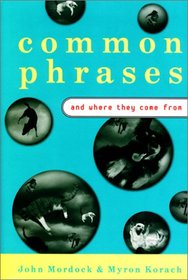Cindy P. (cinderella54) reviewed Common Phrases: And Where They Come From on + 202 more book reviews
interesting trivia
The correct name for this book is "Common Phrases and Where They DIDN'T Come From." I admit reading only 15 pages of this book, and even that was a waste of my time.
I consider myself well-read and knowledgeable. As I was reading the so-called explanations of some common idioms, I kept telling myself, "No, that isn't right," or "That doesn't make sense." I really doubt the authors of this book wasted much of their time either, discovering the origins of many of the phrases.
Here is one good example, their very bad explanation of the idiom "By heck!" --- "It derives from the Greek exclamation 'by Hector,'...named for one of the sons of Achilles. Patroclus...took Hector for a chariot ride around...Troy. Unfortunately, Hector was not in the chariot but tied behind it and dragged into Achilles's (sic) camp mutilated and dead." --- Duh! There is more but I'll leave it at that.
Anyone familiar with "The Illiad" knows Hector was not a son of Achilles, who had no sons, but was the greatest soldier of Troy, a city under attack by the Greeks, of which Achilles was one. Achilles fought Hector in one-on-one combat and killed him, then dragged Hector around Troy by chariot to showed its citizens their hero was dead.
There were so many others like this I decided the authors took very brief notes on the idioms, and then wrote the book from the notes, filling in the text with whatever they thought made sense to them.
Don't waste your credit here.
I consider myself well-read and knowledgeable. As I was reading the so-called explanations of some common idioms, I kept telling myself, "No, that isn't right," or "That doesn't make sense." I really doubt the authors of this book wasted much of their time either, discovering the origins of many of the phrases.
Here is one good example, their very bad explanation of the idiom "By heck!" --- "It derives from the Greek exclamation 'by Hector,'...named for one of the sons of Achilles. Patroclus...took Hector for a chariot ride around...Troy. Unfortunately, Hector was not in the chariot but tied behind it and dragged into Achilles's (sic) camp mutilated and dead." --- Duh! There is more but I'll leave it at that.
Anyone familiar with "The Illiad" knows Hector was not a son of Achilles, who had no sons, but was the greatest soldier of Troy, a city under attack by the Greeks, of which Achilles was one. Achilles fought Hector in one-on-one combat and killed him, then dragged Hector around Troy by chariot to showed its citizens their hero was dead.
There were so many others like this I decided the authors took very brief notes on the idioms, and then wrote the book from the notes, filling in the text with whatever they thought made sense to them.
Don't waste your credit here.
From Amazon:
Cliches, maxims, idioms what are the origins of the countless sayings we repeat? Somebody somewhere said "fly off the handle" for the first time. In Common Phrases and Where They Come From, Myron Korach and John Mordock research the often metaphorical, often image-driven and always taken-for-granted phrases that infuse our daily speech. "Gone haywire," for instance, comes from farmers baling hay using, of course, hay wire, which often tangled, broke, got wrapped around cows or somehow misbehaved. "Feather in your cap" can be traced to various tribal rituals; in early Hungary, it was decreed that "none might wear a feather but he who has slain a Turk." The phrase "cock and bull story," coined by Luther's first followers in "the aftermath of the Reformation," refers to papal bulls, which were stamped with an image of St. Peter and a cock. Wordsmiths everywhere will be delighted.
Cliches, maxims, idioms what are the origins of the countless sayings we repeat? Somebody somewhere said "fly off the handle" for the first time. In Common Phrases and Where They Come From, Myron Korach and John Mordock research the often metaphorical, often image-driven and always taken-for-granted phrases that infuse our daily speech. "Gone haywire," for instance, comes from farmers baling hay using, of course, hay wire, which often tangled, broke, got wrapped around cows or somehow misbehaved. "Feather in your cap" can be traced to various tribal rituals; in early Hungary, it was decreed that "none might wear a feather but he who has slain a Turk." The phrase "cock and bull story," coined by Luther's first followers in "the aftermath of the Reformation," refers to papal bulls, which were stamped with an image of St. Peter and a cock. Wordsmiths everywhere will be delighted.




